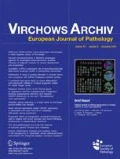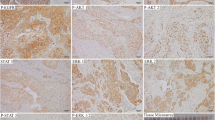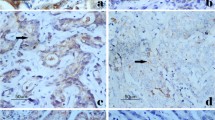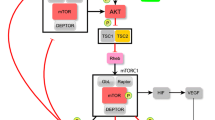Abstract
The immunohistochemical expression of phosphorylated (activated) Akt (pAkt) in 50 advanced gastric carcinomas has been analyzed and the results correlated with age, sex, location in the stomach, histotype, stage, survival, mitotic and apoptotic index, some cell cycle regulators (cyclin D1, cyclin E, p34/cdc2, p27/kip1), and cell proliferation. There was a statistically significant direct correlation between pAkt expression (both cytoplasmatic and nuclear) and depth of infiltration of the tumor, number of infiltrated lymph nodes and p34/cdc2 expression, and between prevalently nuclear pAkt and cyclin D1 and cyclin E. Conversely, there was a significant inverse correlation between nuclear pAkt and apoptotic index and between cytoplasmatic and nuclear pAkt and patient survival. No correlation was found between pAkt and sex, age, tumor location, histotype, mitotic index, and cell proliferation. These findings suggest that pAkt may be considered an indicator of tumor progression and patient survival in gastric cancer.




Similar content being viewed by others
References
Axon A (2002) Review article: gastric cancer and Helicobacter pylori Alimet. Pharmacol Ther 16(4):83–88
Saegusa M, Takano Y, Kamata Y et al (1996) Bcl-2 expression and allelic loss of the p53 gene in gastric carcinomas. J Cancer Res Clin Oncol 122:427–432
Endoh Y, Sakata K, Tamura G et al (2000) Cellular phenotypes of differentiated-type adenocarcinomas and precancerous lesions of the stomach are dependent on the genetic pathways. J Pathol 191:257–263
Fresno Vara JA, Casado E, de Castro J et al (2004) PI3K/Akt signalling pathway and cancer. Cancer Treat Rev 30:193–204
Chang F, Lee JT, Navolanic PM et al (2003) Involvement of PI3K/Akt pathway in cell cycle progression, apoptosis, and neoplastic transformation: a target for cancer chemotherapy. Leukemia 17:590–603
Wang R, Brattain MG (2006) AKT can be activated in the nucleus. Cell Signaling 18:1722–1731
Roy HK, Olusola BF, Clemens DL et al (2002) AKT proto-oncogene overexpression is an early event during sporadic colon carcinogenesis. Carcinogenesis 23:201–205
Altomare DA, Tanno S, De Rienzo A et al (2003) Frequent activation of AKT2 kinase in human pancreatic carcinomas. J Cell Biochem 88:470–476
Alkan S, Izban KF (2002) Immunohistochemical localization of phosphorylated AKT in multiple myeloma. Blood 99:2278–2279
Yamamoto S, Tomita Y, Hoshida Y et al (2004) Prognostic significance of activated Akt expression in pancreatic ductal adenocarcinoma. Clin Cancer Res 10:2846–2850
Ermoian RP, Furniss CS, Lamborn KR et al (2002) Dysregulation of PTEN and protein kinase B is associated with glioma histology and patient survival. Clin Cancer Res 8:1100–1106
Clark AS, West K, Streicher S et al (2002) Constitutive and inducible Akt activity promotes resistance to chemotherapy, trastuzumab, or tamoxifen in breast cancer cells. Mol Cancer Ther 1:707–717
Brognard J, Clark AS, Ni Y et al (2001) Akt/protein kinase B is constitutively active in non-small cell lung cancer cells and promotes cellular survival and resistance to chemotherapy and radiation. Cancer Res 61:3986–3997
Tanno S, Yanagawa N, Habiro A et al (2004) Serine/threonine kinase AKT is frequently activated in human bile duct cancer and is associated with increased radioresistance. Cancer Res 64:3486–3490
Oki E, Baba H, Tokunaga E et al (2005) Aky phosphorylation associates with LOH of PTEN and leads to chemoresistance for gastric cancer. Int J Cancer 117:376–380
Bellacosa A, de Feo D, Godwin AK et al (1995) Molecular alterations of the AKT2 oncogene in ovarian and breast carcinomas. Int J Cancer 64:280–285
Cheng JQ, Ruggeri B, Klein WM et al (1996) Amplification of AKT2 in human pancreatic cells and inhibition of AKT2 expression and tumorigenicity by antisense RNA. Proc Natl Acad Sci USA 93(8):3636–3641
Staal SP (1987) Molecular cloning of the akt oncogene and its human homologues AKT1 and AKT2: amplification of AKT1 in a primary human gastric adenocarcinoma. Proc Natl Acad Sci USA 84:5034–5037
Rusnak DW, Lackey K, Affleck K et al (2001) The effects of the novel, reversible epidermal growth factor receptor/ErbB-2 tyrosine kinase inhibitor, GW2016, on the growth of human normal and tumor-derived cell lines in vitro and in vivo. Mol Cancer Ther 1:85–94
Diehl JA, Cheng M, Roussel MF et al (1998) Glycogen synthase kinase-3beta regulates cyclin D1 proteolysis and subcellular localization. Gen Dev 12:3499–3511
Liang J, Zubovitz J, Petrocelli T et al (2002) PKB/Akt phosphorylates p27, impairs nuclear import of p27 and opposes p27-mediated G1 arrest. Nat Med 8:1153–1160
Philipp-Staheli J, Payne SR, Kemp CJ (2001) p27(Kip1): regulation and function of a haplo-insufficient tumor suppressor and its misregulation in cancer. Exp Cell Res 264:148–168
Pagano M, Tam SW, Theodoras AM et al (1995) Role of the ubiquitin–proteasome pathway in regulating abundance of the cyclin-dependent kinase inhibitor p27. Science 269:682–685
Fero M, Randel E, Gurley KE et al (1998) The murine gene p27Kip1 is haplo-insufficient for tumor suppression. Nature 396:177–180
Besson A, Gurian-West M, Schmidt A et al (2004) p27Kip1 modulates cell migration through the regulation of RhoA activation. Genes Dev 18:862–876
Nakayama K, Nagahama H, Minamishima YA et al (2004) Skp2-mediated degradation of p27 regulates progression into mitosis. Dev Cell 6:661–672
Liang J, Slingerland JM (2003) Multiple roles of the PI3K/PKB (Akt) pathway in cell cycle progression. Cell Cycle 2:339–345
Shin I, Yakes FM, Rojo F et al (2002) PKB/Akt mediates cell-cycle progression by phosphorylation of p27 (kip1) at threonine 157 and modulation of its cellular localization. Nat Med 8:1145–1152
Viglietto G, Motti ML, Bruni P et al (2002) Cytoplasmic relocalization and inhibition of the cyclin-dependent kinase inhibitor p27(Kip1) by PKB/Akt-mediated phosphorylation in breast cancer. Nat Med 8:1136–1144
Greene FL, Page DL, Fleming ID et al (eds) (2002) American Joint Committee on Cancer Staging Manual, 6th ed. Springer, New York
Lauren T (1965) The two histologic main types of gastric carcinoma: diffuse and so called intestinal type. Acta Pathol Microbiol 64:31–49
Vindigni C, Miracco C, Spina D et al (1997) Cell proliferation, cell death and angiogenesis in early and advanced gastric cancer of intestinal type. Int J Cancer 74:637–641
Cicenas J (2008) The potential role of Akt phosphorylation in humane cancers. Int J Biol Markers 23:1–9
Itoh N, Semba S, Masafumi I et al (2002) Phosphorylation of Akt/PKB is required for suppression of cancer cell apoptosis and tumor progression in human colorectal carcinoma. Cancer 94:3127–3134
Liao Y, Grobholz R, Abel U et al (2003) Increase of AKT/PKB expression correlates with Gleason pattern in human prostate cancer. In J Cancer 107:676–680
Okudela K, Hayashi H, Ito T et al (2004) K-ras gene mutation enhances motility of immortalized airway cells and lung adenocarcinoma cells via Akt activation: possible contribution to non-invasive expansion of lung adenocarcinoma. Am J Pathol 164:91–100
Vasko V, Saji M, Hardy E et al (2004) Akt activation and localisation correlate with tumour invasion and oncogene expression in thyroid cancer. J Med Genet 41:161–170
Grille SJ, Bellicosa A, Upson J et al (2003) The protein kinase Akt induces epithelial mesenchymal transition and promotes enhanced motility and invasiveness of squamous cell carcinoma lines. Cancer Res 63:2172–2178
Schmitz KJ, Otterbach F, Callies R et al (2004) Prognostic relevance of activated Akt kinase in node-negative breast cancer: a clinicopathological study of 99 cases. Mod Pathol 17:15–21
Horiguchi A, Oya M, Uchida A et al (2003) Elevated Akt activation and its impact on clinicopathological features of renal cell carcinoma. J Urol 169:710–713
Murakami D, Tsujitani S, Osaki T et al (2007) Expression of phosphorylated Akt (pAkt) in gastric carcinoma predicts prognosis and efficacy of chemotherapy. Gastric Cancer 10:45–51
Han Z, Wu K, Shen H et al (2008) Akt1/protein kinase Bα is involved in gastric cancer progression and cell proliferation. Dig Dis Sci 53:1801–1810
Lee BL, Kim WH, Jung J, Cho SJ et al (2008) A hypoxia-independent up-regulation of hypoxia-inducible factor-1 by AKT contributes to angiogenesis in human gastric cancer. Carcinogenesis 29:44–51
Yu HG, Ai YW, Yu LL et al (2008) Phosphoinositide 3-kinase/Akt pathway plays an important role in chemoresistance of gastric cancer cells against etoposide and doxorubicin induced cell death. Int J Cancer 122:433–443
Kobayashi I, Semba S, Matsuda Y et al (2006) Significance of Akt phosphorylation on tumor growth and Vascular Endothelial Growth Factor expression in human gastric carcinoma. Pathobiology 73:8–17
Cardone MH, Roy N, Stennicke HR et al (1998) Regulation of cell death protease caspase-9 by phosphorylation. Science 282:1318–1321
Brunet A, Bonni A, Zigmond MJ et al (1999) Akt promotes cell survival by phosphorylating and inhibiting a Forkhead transcription factor. Cell 96:857–868
Takano Y, Kato Y, Masuda M et al (1999) Cyclin D2, but not cyclin D1, overexpression closely correlates with gastric cancer progression and prognosis. J Pathol 189:194–200
Aoyagi K, Koufuji K, Yano S et al (2000) Immunohistochemical study on the expression of cyclin D1 and E in gastric cancer. Kurume Med J 47:199–203
Chetty R, Sitti CW (2003) Cyclin E immunoexpression in gastric cancer does not correlate with clinicopathological parameters. Histopathology 42:66–69
Jiaqing L, Hokita S, Xiangming C et al (1998) Role of cyclin E and p53 expression in progression of early gastric cancer. Gastric Cancer 1:160–165
Bani-Hani KE, Almasri NM, Khader YS et al (2005) Combined evaluation of expressions of cyclin E and p53 proteins as prognostic factors for patients with gastric cancer. Clinical Cancer Research 11:1447–1453
Conflict of interest statement
We declare that we have no conflict of interest.
Author information
Authors and Affiliations
Corresponding author
Rights and permissions
About this article
Cite this article
Cinti, C., Vindigni, C., Zamparelli, A. et al. Activated Akt as an indicator of prognosis in gastric cancer. Virchows Arch 453, 449–455 (2008). https://doi.org/10.1007/s00428-008-0676-8
Received:
Revised:
Accepted:
Published:
Issue Date:
DOI: https://doi.org/10.1007/s00428-008-0676-8




